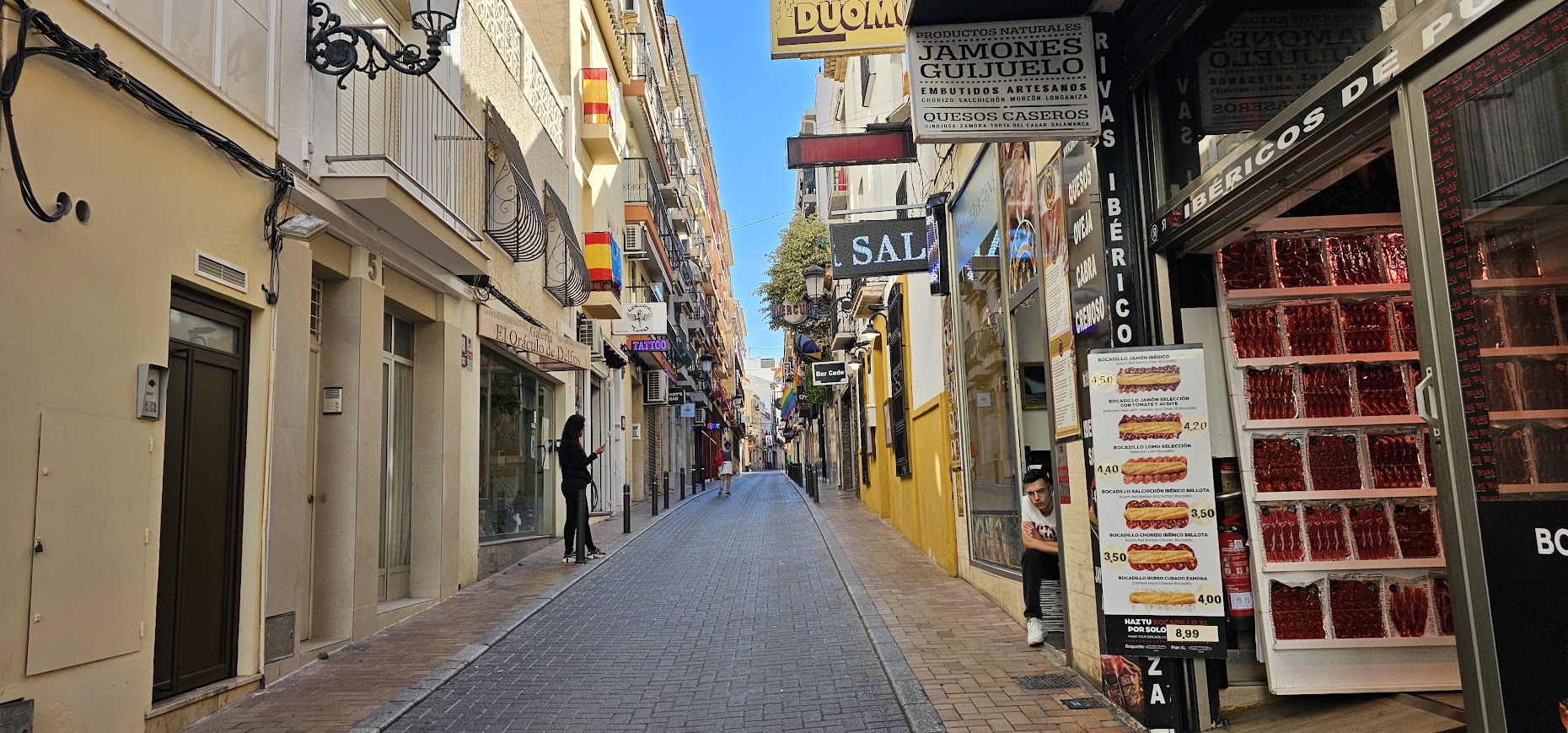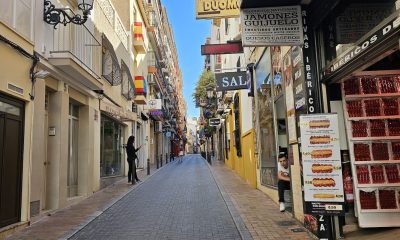Costa Blanca
At Alicante-Elche airport, nine out of ten foreign travellers fly with low-cost airlines

In 2024, Alicante-Elche Airport broke all previous records. After having the greatest start to the year ever, it has surpassed 2023’s passenger numbers by 17% with 18.4 million, and the first month of 2025 has not far behind. The expansion of the Alicante terminal is surpassing the 2024 average for Spanish airports, which was 9%, and solidifying its standing as a national standard.
International traffic, which reached 15.8 million, is partially to blame. The airport’s performance and projections have only improved due to the numerous links with Europe and the variety of airlines that have established bases at El Altet, including Ryanair and EasyJet.
In actuality, the entry of this kind of low-cost airline is what propels traffic at the airport in Alicante-Elche. According to the ‘Sector Report on Tourism in the Province of Alicante. Balance 2024 and prospects 2025’, which was prepared by the Alicante Chamber of Commerce and Cajamar, nine out of ten foreign passengers who arrived at the terminal did so with a low-cost firm.
The number has increased by 17% since 2023, with over seven million passengers arriving on low-cost carriers. Furthermore, with 10.9% of the country’s total passenger traffic, the Alicante terminal is already the fourth-highest airport in Spain for businesses of this kind, trailing only Barcelona, Palma de Mallorca, and Malaga.
Discover more from Costa Blanca Daily
Subscribe to get the latest posts sent to your email.
Costa Blanca
Benidorm is the only municipality in Alicante that requests the authorities to inspect tourist apartments

On March 31st, the Benidorm City Council approved its participation in the framework agreement signed on December 13th by the Generalitat Valenciana (Generalitat Valenciana), through the Ministry of Innovation, Industry, Commerce, and Tourism, and the Valencian Federation of Municipalities and Provinces (FVMP), to assume the delegation of powers to inspect and sanction tourist accommodation in the city. To date, it is the only municipality in the province that has requested this from the Ministry.
At the moment, there are only four applications. Valencia City, Benidorm, Faura, and La Font d’En Carròs have only 6 and 35 registered tourist lodgings, respectively. And this despite the fact that, at the last edition of Fitur, in January, the President of the Generalitat, Carlos Mazón, signed a manifesto between the Generalitat and the Valencian Federation of Municipalities and Provinces (FVMP), which also included Alicante, Torrevieja, and Elche.
This transfer of authorities enables municipalities with local police forces to monitor and resolve disciplinary cases involving tourist accommodation. This entails collecting up to €600,000 per irregular residence in the most egregious situations, which may be a financial lifeline for municipalities.
The fundamental issue with this plan is that the Valencian Government only has 11 inspectors who can execute these functions (4 in Alicante, 4 in Valencia, and 3 in Castellón). Municipalities, through their local police forces, can conduct inspections and punishments and collect the corresponding fines.
In accordance with the time period, “the adhesion agreements will be valid for an initial five years, with the possibility of extension for another five years, and may be terminated by either party upon thirty days’ written notice.”
The Generalitat (Generalitat), which has previously set clear and severe legislation in this regard, sees this as a “key tool for improving the organisation of the tourism sector in the Valencian Community, and contributing to more effective management aligned with public interests.”
In the case of Benidorm, Councillor Lourdes Caselles stated at the municipal plenary session that “the City Council must compile a quarterly report on the complaints filed, the procedures initiated, their resolution and whether or not they result in disciplinary action, and any fines imposed that are paid into the municipal coffers.”
Similarly, in order to carry out this function in better conditions, the Councillor for Urban Planning has explained that the Department of Architecture “is working on an ordinance to regulate tourist housing and to provide security and strengthen this type of tourist accommodation as long as the regulations are complied with” and, in turn, has recalled that the City Council will reinforce the Local Police force, with the announcement of 20 positions, so that “there
Discover more from Costa Blanca Daily
Subscribe to get the latest posts sent to your email.
Costa Blanca
Eight women freed from a brothel in Orihuela

The National Police shut down an organisation in Orihuela that recruited women for sexual exploitation and forced drug trafficking. The National Police detained a 57-year-old male and a 48-year-old woman as alleged ringleaders for offences including prostitution, public health, and money laundering.
The operation freed eight South American women who were being exploited in a brothel
The Alicante Provincial Immigration and Borders Brigade of the National Police took care of the inquiry, completing preliminary investigations that confirmed that the victims had been duped, taking advantage of their financial fragility. The criminals exploited pornographic websites to offer working conditions that were eventually not met, resulting in sexual exploitation.
The male was responsible for recruiting the victims, while the woman controlled the brothel in his absence, determining the rates and conditions for the services, which varied from 20 to 100 euros. They expected the victims to pay 50% of their revenues and be available 24 hours a day, with no option to refuse clients or services.
Overcrowding
The women were subjected to rigorous control: they had no keys to their homes, could only leave to buy food, and were watched over by video surveillance cameras. A diary also documented their earnings and job performance.
It was determined that the victims were also forced to take part in drug trafficking activities. They were ordered to go to a drop-off point and receive cocaine hidden in tobacco packets or plastic bags, transferring 10 to 20 grams per transaction.
They were cramped into a small room with three beds and little ventilation. When there were more than six ladies, some had to sleep in the sexual services area before leaving when a client arrived.
Arrests
Following the inquiry, officers entered the brothel, arresting two suspects and releasing five fresh victims, increasing the total to eight women aged 24 to 51, the majority of whom were in an abnormal administrative condition.
During the search, several items related to the crimes under investigation were seized, including sexual exploitation documentation, seven packages of cocaine, three cans of “poppers” (a substance allegedly used to enhance pleasure), 29 sexual performance-enhancing pills, 350 euros in cash, and two mobile phones.
The inmates had purchased the property where the events occurred using the proceeds from their unlawful activities. The detainees appeared before the Orihuela Court of First Instance.
Discover more from Costa Blanca Daily
Subscribe to get the latest posts sent to your email.
Costa Blanca
Alicante Local Police issued 315 reports in 15 days for violations in the use of e-scooters

As part of the Department of Security and Local Police’s control campaign launched between March 15th and 30th, Alicante has issued 315 fines for failure to use personal mobility vehicles (PMVs) such as electric scooters, skates, skateboards, and similar devices correctly. This activity was preceded by another, which took place between March 11th and 14th, in which officers visited 117 educational centres throughout the city to enlighten pupils on the requirements, characteristics, and various types of automobiles, as well as traffic regulations on urban roads.
Of the 315 breaches recorded by Local Police officers throughout the 15-day campaign, 113 (35%) were for riding in unauthorised pedestrian zones, while another 68 (21.6%) were for riding on unauthorised roadways, accounting for the vast majority of the anomalies discovered. Failure to wear a safety helmet also resulted in 45 additional punishments (14.3%), making it the third most common reason of noncompliance.
Aside from these violations, 19 fines have been imposed for negligent driving, 16 for driving with headphones, a helmet, or using a mobile phone, 14 for violating age limits, 13 for carrying a second passenger, 12 for using bus lanes or tram platforms, 10 for failing to use a bell, lights, or brakes, and five for other offences such as running red lights or driving the wrong way, among others. The PMV control campaign resulted in the inspection of 378 vehicles, five of which were immobilised.
According to Julio Calero, the Security Councillor, “We are working to improve road safety with campaigns like this one aimed at controlling scooters and other personal mobility vehicles, as has the Department of Urban Mobility with the installation of new radars at the main access points to the city, which have managed to reduce the speed limit on a road to 50 km/h and, therefore, improve road safety and reduce the risk of accidents.”
“The Local Police conducted a series of control campaigns that concentrated on street cleanliness and unmanaged waste (debris), resulting in 100 complaints in 10 days. We have now continued to regulate PMVs as part of an informational and instructive campaign throughout the city’s schools. “PMV drivers must know how and where they should drive, as well as their equipment and that of the vehicle, in order to comply with the municipal ordinance,” according to Calero.
The municipal campaign has highlighted forbidden places for electric scooters, including sidewalks, paved promenades, pedestrian zones, bike lanes, bus lanes and the TRAM platform.
Controls were conducted in various areas of the city, including Jijona Avenue, Plaza de España and Plaza de Santa Teresa, City Hall and Old Town, Alfonso El Sabio Avenue, Central Market and Jaime II Avenue, City of Assisi, San Blas, North Zone, Benalúa and Babel, beaches, Pintor Baeza-Colombia streets, Altozano and Los Ángeles, La Florida, southern zone around Elche Avenue, Gran Vía, and San Gabriel.
One of the campaign’s goals is to ensure that pedestrians have the right of way and travel at reasonable speeds, while simultaneously opposing careless or dangerous driving. The minimum age for electric-powered MPVs is 16, and only one seat is permitted on board. Fines for violating the municipal ordinance range from €100 to €500.
“This awareness and surveillance campaign highlights the importance of driving these vehicles with caution and the priority of respecting pedestrians and other road users,” according to Calero. “It also emphasises the need to wear a protective helmet, avoid riding on pavements or in pedestrian areas, and observe speed limits up to a maximum of 25 kilometres per hour,” she said.
Discover more from Costa Blanca Daily
Subscribe to get the latest posts sent to your email.
-

 Costa Blanca1 week ago
Costa Blanca1 week agoThe El Raso, Guardamar celebrates with a Tapas Route and concerts between May 15th and 17th
-

 Costa Blanca3 days ago
Costa Blanca3 days agoIberdrola announces power outages in Alicante and 13 municipalities from May 17th to 23rd
-

 Costa Blanca1 week ago
Costa Blanca1 week agoAP7 Motorway tunnel at Pilar de la Horadada CLOSED due to fire
-

 News2 weeks ago
News2 weeks agoFour people arrested in Alicante province for storing and exchanging child pornography
-

 Costa Blanca1 week ago
Costa Blanca1 week agoElche joins the national protests for Palestine on May 10th
-

 Costa Blanca2 weeks ago
Costa Blanca2 weeks agoMosquitoes in Elche and Santa Pola are on the warpath
-

 Costa Blanca2 weeks ago
Costa Blanca2 weeks agoOne dead when a motorcycle collides with truck on Orihuela Costa
-

 Costa Blanca2 weeks ago
Costa Blanca2 weeks agoTorrevieja will celebrate the Europe Day Gala tomorrow












